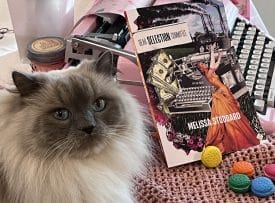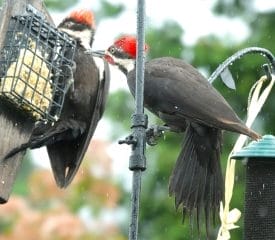Zoo Visits, Crowns, and Family Emergencies, Melissa Studdard’s Dear Selection Committee and Setting Boundaries in the Lit World
- At June 12, 2022
- By Jeannine Gailey
- In Blog
 1
1
Zoo Visits, Crowns, and Family Emergencies
This week felt stressful. Glenn’s parents (who are yes, vaccinated) tested positive for Covid, and his father was in the hospital for related heart issues. It’s very hard to be far apart when your loved ones are going through health crises. Glenn’s brother did a great job of keeping us informed, but it reminded us both that living far from your parents can be stressful and it’s hard when you can’t help.
I also had a long dental appointment – I was supposed to get three crowns in one morning, two of them from root canals from the previous two years – it ended up, thankfully, only being two crowns – and we decided to spend an hour or so the day before at the Zoo in a brief window of “no rain,” where they’d recently re-opened an exhibit that had been closed for two years during the pandemic, the butterfly house. The birds were all off display because of the threat of Avian flu – a bit of a metaphor for our own pandemic, right? I’m really off-exhibit right now? But we had a chance to see the snow leopards, who don’t always make such nice appearances for us. Spending a few moments admiring the beauty of butterflies and snow leopards was an excellent stress-reliever. The rain came back the next day and has stuck around, it feels like, forever.
- Swallowtail and Yellow Flowers
- Swallowtails on Evergreen
- Another type of Swallowtail
Melissa Studdard’s Dear Selection Committee
Had the pleasure of reading Melissa Studdard’s new book from Jackleg Press, Dear Selection Committee. This is a book of exuberant, joyful, and heck, sexy and fun poems set into the framework of applying for a very specialized kind of job. Some poems are heartbreaking, taking on contemporary tragedies. It’s an inspiring book, too, making me want to write for the first time in ages.
Here’s a short excerpt from “My Kind,” the opening poem: “I am my own kind. I’ll learn to play piano. Like Helene Grimaud, / I’ll see blue rising from the notes. I’ll be an amateur bird watcher,/ a volunteer firefighter, a gourmet chef, a great/ humanitarian. I’ll plant a prize-winning garden,/ grow a pot farm. My hair is on fire. I’m running/ out of time.” The cover art by Karynna McGlynn is also amazing.
 Setting Boundaries in the Lit World (Is Hard)
Setting Boundaries in the Lit World (Is Hard)
I’ve been writing an essay for an anthology on “Self Care for the Disabled and Chronically Ill Writer.” Writing this essay has made me start to think about drawing more boundaries around my life, especially around unpaid labor. Since I started living life as a creative writer, I’ve been writing book reviews, blurbs, writing recommendation letters, volunteering on boards of lit mags, as the editor of lit mags, served as Redmond’s Poet Laureate (paid, but barely), taught at an online MFA program (again, paid, but barely), run youth programs for creative writing, hosted readings, and just given advice to strangers at random when they asked for twenty years. Twenty years!
Some of these things brought/bring me real joy – I still get a thrill out of introducing young people to the kind of fun poetry they’ve never experienced – but other parts, I fear, have started to not bring joy. I’ve talked, in my book PR for Poets, and on this blog, about the idea of writing karma – that we give back what we can when we can in the hopes that the good energy would come back around.
As someone with limited energy and time, I have to start setting boundaries in the lit world – when to say no, when to say yes. I’ve also realized that writing friendships, though sometimes requiring more energy, are something essential to keeping me going when I get discouraged, so I want to spend more energy on the friendships that are actually mutually beneficial (because, let’s be honest, they aren’t all mutually beneficial). I’m not a person who likes to set limits or say no. But this is part of self care. I cannot give and give forever. And as someone with expensive dental care (see above) and medical care (try having MS sometime – it’s super expensive), I may need to focus a bit more on work that pays more than “almost nothing.” These are hard decisions. But protecting your time – if you are a chronically ill and/or disabled writer – is one of the most important things you can do for your writing. If you’re worn out by unpaid labor, you are not as likely to write your best work or have the energy to promote it. So choose you. (This is really hard, especially for those of us with people-pleasing tendencies.) As I get older, I want to claim my time more. We do not have forever – choose the things that are really at the top of your priority list. Spending time at the dentist or doctor or testing or physical therapy – while not my favorite things – are necessary evils, and they already take away time from family, fun, writing, and things like spending time regenerating your soul with butterflies. When I consider how my light is spent, as someone wise once said.









 Jeannine Hall Gailey served as the second Poet Laureate of Redmond, Washington and the author of Becoming the Villainess, She Returns to the Floating World, Unexplained Fevers, The Robot Scientist’s Daughter, and winner of the Moon City Press Book Prize and SFPA’s Elgin Award, Field Guide to the End of the World. Her latest, Flare, Corona from BOA Editions, was a finalist for the Washington State Book Award. She’s also the author of PR for Poets, a Guidebook to Publicity and Marketing. Her work has been featured on NPR’s The Writer’s Almanac, Verse Daily and The Year’s Best Fantasy and Horror. Her poems have appeared in The American Poetry Review, Poetry, and JAMA.
Jeannine Hall Gailey served as the second Poet Laureate of Redmond, Washington and the author of Becoming the Villainess, She Returns to the Floating World, Unexplained Fevers, The Robot Scientist’s Daughter, and winner of the Moon City Press Book Prize and SFPA’s Elgin Award, Field Guide to the End of the World. Her latest, Flare, Corona from BOA Editions, was a finalist for the Washington State Book Award. She’s also the author of PR for Poets, a Guidebook to Publicity and Marketing. Her work has been featured on NPR’s The Writer’s Almanac, Verse Daily and The Year’s Best Fantasy and Horror. Her poems have appeared in The American Poetry Review, Poetry, and JAMA.







Dave Bonta
I’ll be excerpting the Studdard review part of your post for the digest, but wanted to say how much I also appreciate your thoughts on the preciousness of time, something I’ve been reflecting on a lot even as a relatively privileged non-disabled person. Death stalks us all, as the comedian James Acaster so succinctly put it with typical young-person insouciance.